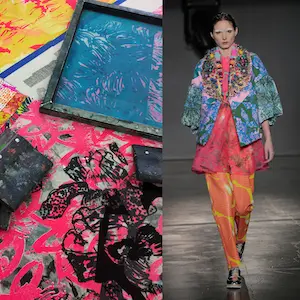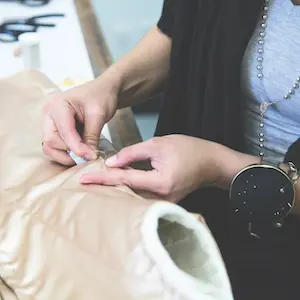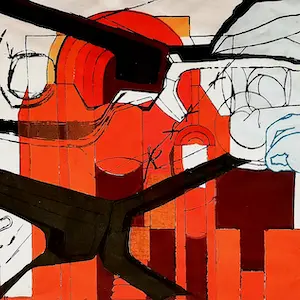Textile Design (BFA)
Textile Design (BFA)
From fabric burnout to photographic screen printing to computer–assisted print designs, students in the BFA Textile Design program design and print on both fabric and paper using various print techniques and fabric manipulation. Students develop their drawing and color skills in course work that combines excellence in design, artistic vision, and innovative technology to provide students with the skills necessary to realize their creative visions fully. Students are encouraged to participate in industry competitions and internships. Senior students may collaborate with other fashion design or knitwear majors to produce a runway collection for the annual San Francisco Fashion Show.
MFABachelor of Fine Arts (BFA) Degree
This program is only available onsite.
Core Classes












Unit Requirements
| Major Coursework | Units |
|---|---|
| Core | 36 |
| Major | 33 |
| Electives | 9 |
| Liberal Arts | 42 |
| Total | 120 |
Degree Requirements
BFA TEXTILE DESIGN DEGREE REQUIREMENTS
- Minimum grade of C- in all major coursework.
- Minimum 2.0 GPA and the following general education requirements:
4 Art Historical Awareness courses
1 Creative Communication course
1 Written Communication: Critical Thinking course
1 Historical Awareness course
1 Quantitative Literacy course
1 Cultural Ideas & Influences course
1 Employment Communications and Practices course
After above general education requirements are met, take Liberal Arts electives as needed to fulfill the Liberal Arts unit requirement.
Additional Information

Program Learning Outcomes
Undergraduate students will meet the following student performance criteria:
Research and Concept Development
- Produce creative and original designs
- Select design concepts appropriate for the customer
- Generate ideas that are coherently related to the chosen concept
- Conduct thorough design research
- Demonstrate evidence of trialing and self-editing designs
- Propose designs that are possible to translate from 2D to 3D
Visual Presentation Skills
- Create professional and organized presentations that reflect an individual/personal style
- Effectively communicate design concepts and philosophy two-dimensionally
Technical Skills
- Work effectively with industry standard software
- Demonstrate technical proficiency in design communication
Verbal and Written Presentation Skills
- Clearly express ideas utilizing industry vocabulary
Professional Readiness
- Create a relevant and original portfolio and collateral materials which can be used to market themselves to the industry
Academy of Art University Learning Outcomes
Graduates of the Academy of Art University will demonstrate the ability to:
- Produce a body of work suitable for seeking professional opportunities in their chosen field of art and design.
- Solve creative problems within their field of art and design, including research and synthesis of technical, aesthetic, and conceptual knowledge.
- Communicate their ideas professionally and connect with their intended audience using visual, oral, and written presentation skillsrelevant to their field.
- Execute technical, aesthetic, and conceptual decisions based on an understanding of art and design principles.
- Use professional terminology to evaluate their work and work in the field.
- Recognize the influence of major cultural and aesthetic trends, both historical and contemporary, on art and design products.
- Learn the professional skills and behaviors necessary to compete in the global marketplace for art and design
- Engage with a variety of communities beyond the classroom through internship opportunities, study abroad programs, athletics, student interest clubs, and participation in collaborative, civic, and pro bono projects.
*Semester plans are subject to change at any time. Semester breakdowns displayed are suggested and additional options are available to help customize your educational experience. Speak to an admissions or student services representative for more information. Please see our catalog for more details at: https://catalog.academyart.edu